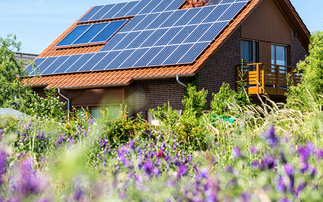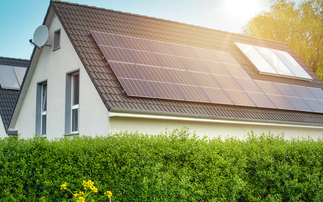Velux Group accuses politicians of ignoring buildings role in tackling climate change during COP21 summit
Some of them are dirty great slabs of concrete, while in the French capital of Paris many are tall elegant blocks.
If you live in a city, buildings dominate skylines. They may look inert from the outside, but inside they are vast consumers of energy and their leaky walls and windows, not to mention inefficient heating and cooling systems, are one of the biggest single contributors to climate change causing greenhouse gases.
In Europe alone, buildings account for 40 per cent of energy consumed, yet somehow they are largely overlooked by politicians trying to tackle climate change.
Europe has repeatedly failed to set a legally binding target to reduce energy usage, only agreeing voluntary targets to cut energy use by 20 per cent by 2020 rising to 27 per cent by 2030 based on 1990 levels. Meanwhile, in the UK the new Conservative government has scrapped its domestic energy efficiency financing scheme the Green Deal, shelved its Zero Carbon Home standards, and just announced it is to cut it ECO grant funding initiative for tackling fuel poverty through energy efficiency refits.
However, Jørgen Tang-Jensen, chief executive of window maker Velux Group, reckons the building industry has to take some of the blame for the sectors' sidelining, having failed to make a sufficiently good case for energy efficiency investment.
"We in the building industry are not nearly as good as lobbying as those coming from different kinds of energy companies," he tells BusinessGreen on the sidelines of this week's Paris Summit. "It seems like most of the focus has been on how to have cleaner energy, renewable energy. But actually the best energy is the energy we don't use."
However, there are signs the role of energy efficiency could yet be pushed up the agenda of policymakers ar the summit. The COP21 climate talks will put energy efficiency front and centre stage on Thursday, during a dedicated "buildings" day, and Tang-Jensen says he remains hopeful that buildings will be referenced in any final text delivered by the negotiators.
Busineses from across the sector are expected to present a pledge to COP21 negotiators to reduce CO2 by 84 gigatonnes by 2050. And Velux Group is this week calling on world leaders to refocus their efforts on the role buildings can play in reducing greenhouse gas emissions.
To back up these calls, Velux has built 21 houses in 12 countries with different climatic conditions demonstrating the latest in energy-saving and low emission technologies. Crucially, many of the green technologies used in the homes are already available in shops today. Tang-Jensen says this shows countries can deliver on more efficient building codes in an affordable manner.
"These experiments have proved that the solutions for tomorrow's buildings are already here," added Jensen. "But we should not only look at future housing; 90 per cent of the buildings we will be using in 2050 have already been built, and most of them are in need of modernisation to improve comfort as well as energy efficiency."
Velux's comments come amid a series of announcement from the building industry during the first few days of the Paris climate talks.
For example, HAB Housing, the firm backed by TV broadcaster Kevin McCloud, announced on Friday that it would start building "energy positive" homes by 2018, which produce more energy than they consume.
In a statement, McCloud criticised the UK government for rolling back green building policies and increasing subsidies for fossil fuels, but argued there was still a compelling case for developing greener buildings.
"I believe passionately that housebuilders and progressive businesses can step in where government fails," he said, " It's in our power to harness innovation, embrace the newest low-energy technologies, reduce demand (and cost) for people and help build communities that are sustainable and low-impact. That's why I'm very proud that HAB can today make this pledge and also lay down the gauntlet to the construction supply industry to help us deliver against it."
Meanwhile, the UK Green Building Council announced the launch of a new research project to assess the potential for banks to offer "green mortgages" that reward the most efficient homes.
Dubbed the LENDERS project, the initiative will use energy performance certificate data to test whether lenders can make better use of energy information when assessing mortgage affordability. It is backed by Innovate UK, as well as Nationwide Building Society, Principality Building Society, Zero Carbon Hub, Constructing Excellence in Wales, BRE, Energy Saving Trust, Arup and University College London (UCL).
Julie Hirigoyen, chief executive of the UK Green Building Council, said there were reasons to believe green mortgages could reward the most efficient homes. "With energy bills representing one of the biggest costs that households face, it seems common sense for lenders to take them into account when assessing mortgage affordability," she said. "But despite this helping to reduce lending risks and encourage retrofit, it has so far failed to become mainstream practice with banks and building societies."
"The LENDERS project - which builds upon our work on mortgages earlier this year - is intended to tackle this head on: building the evidence base for change and coming up with a methodology that lenders could easily adopt into their calculations. If successful, it could have a transformative impact on the building industry, potentially translating into efficient homes gaining value relative to their inefficient counterparts."
Perhaps when the greenest and most efficient homes command a healthy price premium it will be easier to convince policy makers of the merits of energy efficiency.
This article is part of BusinessGreen's Road to Paris hub, hosted in association with PwC.







